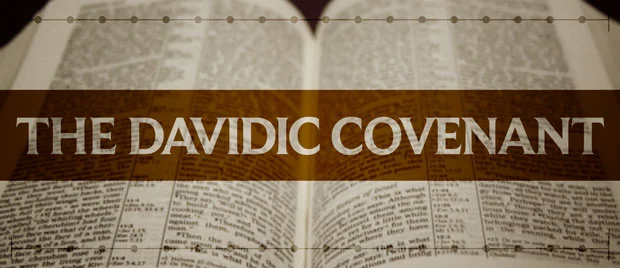The Davidic Covenant

The story of David's rise to the throne of Israel is found in 1 Samuel 16–2 Samuel 4. In 1 Samuel 16, David is shown to be God's chosen one and is anointed king by Samuel (1 Sam. 16:1, 12–13). The anointing of David anticipates the founding of the Davidic dynasty, a crucial event in redemptive history.1 The anointing of David is also crucial for understanding the Old Testament concept of the Messiah (Heb. mashiah). As Dillard and Longman explain, "The Hebrew term mashiah means 'anointed one,' and the idea of a Messiah for Israel grows out of her ideology about a righteous king, one who would be like David."2 Throughout the books of Samuel, the "Lord's anointed" is a major theme (cf. 1 Sam. 16:3, 6, 12–13; 24:6; 26:9, 11, 16, 23; 2 Sam. 1:14, 16; 3:39; 19:21). The king is God's anointed one, that is, his "messiah." The rule of David as God's anointed one, his "messiah," is later used by the prophets to picture the coming eschatological king (cf. Isa. 7:14–16; 9:1–7; 11:1–16).3 The remaining chapters of 1 Samuel recount David's rise in popularity and Saul's repeated attempts to kill him (1 Sam. 17–31). The first book of Samuel ends with the ignominious death of Saul (1 Sam. 31:3–4).
After David learns of the death of Saul, and mourns for him (2 Sam. 1:4, 17–27), the men of Judah anoint him king (2 Sam. 2:4). But Abner, the commander of Saul's army, anoints Saul's son Ish-bosheth to be king over Israel (2 Sam. 2:8–11). There follows a long war between the house of David and the house of Saul (2 Sam. 3:1), but Abner ultimately joins David, Ish-bosheth is murdered, and David is anointed king over all Israel (2 Sam. 5:3–4).4 David then defeats the Jebusites and takes the city of Jerusalem, calling it the city of David (2 Sam. 6–9). The ark of the covenant, the symbol of the throne of the divine King, is brought to Jerusalem (2 Sam. 6:1–15), and from that point onward the city becomes the religious and political center of the Davidic kingdom.5
A key event in redemptive history is recorded in 2 Samuel 7. According to Walter Brueggemann, this chapter "occupies the dramatic and theological center of the entire Samuel corpus."6 The chapter records the events surrounding the establishment of the Davidic covenant. Dumbrell helpfully explains why the events of this chapter follow those of chapter 6.
What is thus being said by the sequence of these chapters, is that Yahweh's kingship must be first provided for before the question of Israel's can be taken up. Only when such an acknowledgement of Yahweh's rule has been made may the possibility of a firmly established Israelite royal line be discussed.7
David had captured Jerusalem and had brought the ark into the city, and God had given him rest from all his enemies (2 Sam. 7:1). At this point, David calls Nathan the prophet and expresses his desire to build a "house" (Heb. bayit) before God, a permanent temple instead of a tent.8 God's response to David is found in 2 Samuel 7:4–16.
God reminds David that since the time he brought Israel out of Egypt he has moved with the people in the tabernacle (2 Sam. 7:4�–7). He reminds David that he has been with him wherever he went and has defeated David's enemies (2 Sam. 7:8–9a). He then promises David that he will make for David a great name (2 Sam. 7:9b). God declares that he will give Israel rest from her enemies and that he will make a house for David (2 Sam. 7:10–11). God promises that he will establish the kingdom of David's offspring (2 Sam. 7:12). He promises that David's offspring will build a house for God, and that he will establish David's kingdom forever (2 Sam. 7:13).
God promises, "I will be to him a father, and he shall be to me a son" (2 Sam. 7:14a). God warns that he will discipline David's offspring if he commits iniquity, but God also promises that his steadfast love will not depart from David as it was taken from Saul (2 Sam. 7:14b–15). Finally, God promises David, "And your house and your kingdom shall be made sure forever before me. Your throne shall be established forever" (2 Sam. 7:16). David's prayer of gratitude is found in 2 Samuel 7:18–29. In this prayer, he refers to God's promise as "instruction for mankind," indicating that this covenant will involve the destiny of all mankind (2 Sam. 7:19).9
Although the Hebrew term for "covenant" (berit) is not found in this chapter, Scripture elsewhere does refer to this promise as a covenant (cf. 2 Sam. 23:5; Ps. 89:3). The Davidic covenant had been anticipated in God's covenant with Abraham (cf. Gen. 17:6). It would be through the Davidic king that God's promise of blessing to the nations would be accomplished (cf. 2 Sam. 7:19; Ps. 72:8–11, 17). The Davidic covenant had also been anticipated in the Mosaic covenant (cf. Deut. 17:14–20). The Davidic king would be the expression of God's theocratic rule in Israel. He was to reflect the righteous rule of the divine King. He was also to lead Israel in the faithful observance of the Mosaic law. The Abrahamic covenant had promised a realm and a people for God's kingdom. The Mosaic covenant provided the law of the kingdom. The Davidic covenant now provides a human king for the kingdom. God's creational purpose to establish his kingdom with his image-bearer exercising dominion now reaches a new stage in its progressive accomplishment.10
One of the major emphases of the Davidic covenant is the idea of perpetuity. David had wanted to build for God a permanent dwelling place, but God instead promised that he would establish for David a permanent dynasty.11 The Hebrew term 'ad -'olam, or "forever," is found eight times in this chapter emphasizing the significance of this aspect of the covenant. As Anderson explains, "The main feature of this kingship will be its permanent stability: it will last forever (2 Sam. 7:13b, 16)."12
In Genesis 49:10, Jacob had prophesied that the scepter would belong to the tribe of Judah until the coming of the one to whom such royal status truly belonged. This prophecy finds its initial fulfillment in the establishment of the Davidic kingship.13 But the Davidic covenant looks not only to the fulfillment of past prophecies, it also looks forward, laying the foundation for Israel's eschatological hopes. The Davidic covenant becomes the foundation for the messianic prophecies of the later prophets.[^16] As O. Palmer Robertson explains, the Davidic throne "was a typological representation of the throne of God itself."14 The relationship is so close that the throne of David is referred to in Scripture as the "throne of Yahweh" (1 Chron. 29:23). With the coming of the Davidic monarchy, then, God's kingdom had already come to some extent, but it remained a shadow of a greater future reality.15
The Davidic covenant became, as Bergen observes, "the nucleus around which messages of hope proclaimed by Hebrew prophets of later generations were built…"16 This covenant is mentioned or alluded to in several of the Psalms (cf. Ps. 21, 72, 89, 110, 132). It is also alluded to in the prophetic writings. As the monarchy eventually began to slide into wickedness, the prophets began to understand the promises of the Davidic covenant eschatologically. As Joyce Baldwin notes, the prophets taught that David's "booth would be repaired (Am. 9:11); a Davidic child would establish his throne with justice and with righteousness (Is. 9:6–7); a branch from the stump of Jesse would yet create an ideal kingdom (Is. 11:1–9; cf. Je. 23:5; Zc. 3:8)."17 The promises that had not yet been fulfilled would be fulfilled in the future (cf. Isa. 7:13–25; 16:5; 55:3; Jer. 30:8; 33:14–26; Ezek. 34:20–24; 37:24–25; Hos. 3:5; Zech. 6:12–13; 12:7–8). Ultimately, these messianic hopes would be fulfilled in Jesus, the true Son of David (cf. Matt. 1:1; Acts 13:22–23).18
This article is part of the The Unfolding of Biblical Eschatology collection.
-
Willem A. VanGemeren, The Progress of Redemption (Grand Rapids: Zondervan, 1988), 202 ↩
-
Raymond B. Dillard and Tremper Longman III, An Introduction to the Old Testament (Grand Rapids: Zondervan, 1994), 146. ↩
-
William J. Dumbrell, The Search for Order: Biblical Eschatology is Focus (Grand Rapids: Baker, 1994), 64. ↩
-
It is worth noting that the establishment of David’s kingship occurs in progressive stages. He is anointed as the rightful king by Samuel in 1 Samuel 16. Much later, in 2 Samuel 2:4, he is anointed king over Judah. Only after a long war between his house and the house of Saul (2 Sam. 3:1) is he anointed king over all Israel (2 Sam. 5:3–4). ↩
-
VanGemeren, The Progress of Redemption 207. ↩
-
Walter Brueggemann, First and Second Samuel, Interpretation (Louisville: Westminster, 1990), 253; cf. A. A. Anderson, 2 Samuel, WBC 11 (Waco: Word Books, 1989), 112. ↩
-
William J. Dumbrell, Covenant and Creation: A Theology of Old Testament Covenants (Nashville: Thomas Nelson, 1984), 142. ↩
-
The word “house” is used 15 times in this chapter, but it is used with four different denotations. It is used to refer to a king’s palace (vv. 1, 2); a temple (vv. 5, 6, 7, 13); a royal dynasty (vv. 11, 16, 19, 25, 26, 27, 29); and a family (v. 18). See Hamilton 2004, 317. ↩
-
Dumbrell, Covenant and Creation, 152. ↩
-
Dumbrell, Covenant and Creation, 127. ↩
-
O. Palmer Robertson, The Christ of the Covenants (Phillipsburg: P&R, 1980), 232. ↩
-
Anderson, 2 Samuel, 122. ↩
-
Robert D. Bergen, 1, 2 Samuel, NAC (Nashville: Broadman, 1996), 336. ↩
-
Robertson, Christ of the Covenants, 249. ↩
-
Robertson, Christ of the Covenants, 241. ↩
-
Bergen, 1, 2 Samuel, 337. ↩
-
Joyce G. Baldwin, 1 and 2 Samuel: An Introduction and Commentary, TOTC 8 (Downers Grove, IL: InterVarsity, 1988), 213. ↩
-
Bergen, 1, 2 Samuel, 337–8. Jesus is the Son of David who will build a “house” for God, a new temple made without hands. He is the Son of David whose kingdom is established forever. ↩


